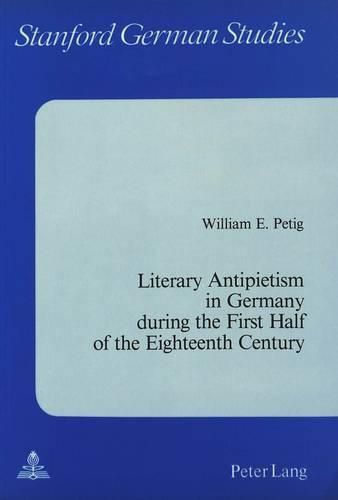Readings Newsletter
Become a Readings Member to make your shopping experience even easier.
Sign in or sign up for free!
You’re not far away from qualifying for FREE standard shipping within Australia
You’ve qualified for FREE standard shipping within Australia
The cart is loading…






Pietism had a considerable impact on the cultural and social life of eighteenth-century Germany. However, the confrontation between what was essentially a religious movement and the literary world has not been adequately explored. This is particularly true of the negative reaction to Pietism in German literature or literary antipietism, as it is referred to here. After establishing the background against which literary anti- pietism develops, the book examines those German literary works from the first half of the eighteenth century which portray Pietists in a negative manner and sheds light on the genesis as well as on the public reception of these works. The last chapter dis- cusses the theological basis for the Pietists’ opposition to secular literature and the theater, chronicles their efforts in Halle to close theaters and forbid the reading of worldly literature in the schools, and analyzes the Pietists’ understanding of the creative process as it relates to literature and the arts.
$9.00 standard shipping within Australia
FREE standard shipping within Australia for orders over $100.00
Express & International shipping calculated at checkout
Pietism had a considerable impact on the cultural and social life of eighteenth-century Germany. However, the confrontation between what was essentially a religious movement and the literary world has not been adequately explored. This is particularly true of the negative reaction to Pietism in German literature or literary antipietism, as it is referred to here. After establishing the background against which literary anti- pietism develops, the book examines those German literary works from the first half of the eighteenth century which portray Pietists in a negative manner and sheds light on the genesis as well as on the public reception of these works. The last chapter dis- cusses the theological basis for the Pietists’ opposition to secular literature and the theater, chronicles their efforts in Halle to close theaters and forbid the reading of worldly literature in the schools, and analyzes the Pietists’ understanding of the creative process as it relates to literature and the arts.